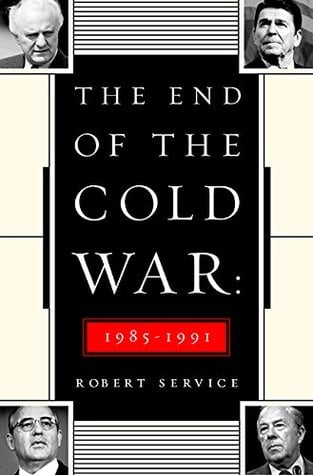The evidence of the end of the Cold War around 1990 was clearer than evidence of its beginning had been around, say, 1947. By “Cold War” we mean the conflict between the United States and the Soviet Union—not that between the United States and China, which was the outcome of civil war in the latter country. In or about 1949-50 China became communist, and so she still claims to be, while Russia is communist no longer. During the Cold War the United States involved herself in many marginal conflicts—in Korea, Vietnam, Cuba, the Middle East—mostly because of communism. Yet it was not international communism that led to the Russo-American Cold War; it was the division of Europe, the prime consequence of World War II. In 1945, Germany and Central Europe were subdued and divided. It took some time for the American government and for the American people to recognize what that division meant: that the Russian conquest and occupation of most of the eastern half of Europe would be absolute and unconditional, including the imposition of communist regimes on its states. That had little or nothing to do with “International Communism,” and everything to do with what Stalin and successive Russian leaders considered to be the security of their Soviet Union. Something like an “iron curtain” now separated most of Eastern Europe (and East Germany, and East Berlin) from the West. Soon, the United States and the Soviet Union had built enormous armaments, including thousands of atomic bombs. But for more than 40 years these two superpowers did not come close to going to war against each other. Hence the “Cold War” was (and remains) an accurate term.
The Soviet Union and communism were always weaker and more brittle than their opponents, including most Americans, thought. Evidences of this appeared here and there, and after about 1980 they began to accumulate. This was yet another example of an historical tendency, by which popular disaffections occur not when the power and terror of a regime are strongest, but when they begin to weaken. New leaders may then arise, some of them reformers. That was the case in Russia, where Mikhail Gorbachev rose to power in 1985. Gorbachev put an end to communism in the Soviet Union, and—more importantly—to the Cold War, and in 1991 he was forced to stand down. A quarter-century later the present rulers of Russia condemn him as a near-traitor. For us (and for much of the world) our due to him is enduring respect, and perhaps even admiration.
Purchase The End of the Cold War: 1985-1991 by Robert Service here
Gorbachev’s American counterpart (more precisely, corespondent) was Ronald Reagan, a convinced anticommunist and a complete American nationalist, elected and respected by a majority of the American people. In spite of all that, he chose to respond to Gorbachev. The two men talked by telephone; they met; they gave and took; they compromised on occasion. It was not only that they came to like each other; there was something like an unprecedented sense of trust in the air between Reagan and Gorbachev, and also between the advisors each of them had chosen. Gorbachev went so far as to propose the elimination of all nuclear weapons in the American and Russian arsenals. Reagan did not go that far, but he and his successor George H.W. Bush concluded that the Cold War—the dreadful confrontation of America and Russia—was over. Much more important than reductions in armaments was the ending of the division of Europe. By 1996 the former satrapies of Russia had achieved and declared their independence—Poland, Hungary, Czechoslovakia, Rumania, Bulgaria, and very soon the three small Baltic republics, too, and even before the end of 1989 the division of Germany and of Berlin was gone. So was the Union of Soviet Socialist Republics, the official name of the once-communist empire, and its red flag, as Russia reverted to Russia again, and to her flag. Gorbachev, having ended the division of Europe and the Cold War and dismantled Russia’s empire in Eastern Europe, retreated into obscurity.
All of this is an enormously important chapter in the history of Russia, and of the United States and of Europe as well. We have now the first substantial account of these events: a book of 643 pages summing up hardly more than the five years 1985-91. Robert Service, an accomplished historian and specialist in contemporary Russian affairs, knows Russian history well and had access to many private papers and memoirs both Russian and American, and to some Russian archives. Of course, the difficulties and the complexities of the subject are such that only future histories of those crucial years can address satisfactorily. What we know about Russia and of her people then as well as now is far from sufficient.
Purchase The End of the Cold War: 1985-1991 by Robert Service here
I have only two considerable disagreements with Service’s important book. One is his unbridled admiration for Ronald Reagan and Reagan’s role in moving the Cold War to its end. (Yet to this caveat I must add that his depiction and treatment of Reagan merit considerable attention by future historians.) The other is Service’s statement that the American people and most of their spokesmen greeted Russia’s retreat from the Cold War as an American triumph. This was not so. I myself was heartened and impressed by the absence of jubilation and self-congratulation here in 1989-90, and also in the years before and after. Russia lost the Cold War, but had America won it? Yes, rather than no; and to state that should be enough. The United States is the greatest power in the world—and so she was even during the worst years of the Cold War. Putin—Gorbachev’s bitter critic and foe—knows that. But will the age-old Russian sense of inferiority lead him into a new Cold War? I don’t think so.
[The End of the Cold War: 1985-1991, by Robert Service (New York, NY: PublicAffairs) 643 pp., $35.00

Leave a Reply